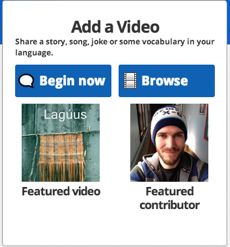Thanks to a new feature on the Endangered Languages Project (ELP) website, language activists who may not have ready access to a digital video camera can now make their own contribution towards the revitalization of their endangered language online. The new “Add a Video” feature allows users to create their own citizen media by recording a video directly from their computer's webcam for upload and sharing with the wider community.
 This project from the Alliance of Linguistic Diversity seeks to “put technology at the service of organizations and individuals working to confront the language endangerment by documenting, preserving, and teaching them.” Originally launched by Google, the ELP is now administered by the First Peoples’ Cultural Council and the Institute for Language Information and Technology (The Linguist List) at Eastern Michigan University.
This project from the Alliance of Linguistic Diversity seeks to “put technology at the service of organizations and individuals working to confront the language endangerment by documenting, preserving, and teaching them.” Originally launched by Google, the ELP is now administered by the First Peoples’ Cultural Council and the Institute for Language Information and Technology (The Linguist List) at Eastern Michigan University.
In addition to allowing for the uploading of other videos or sharing links to videos already available on YouTube, this option for direct recording can be an opportunity to hear more voices from diverse language communities. Once the video is recorded, it can be uploaded, tagged, and shared with the growing ELP community. Video creators can choose from a particular theme such as Food, Humor, Greetings, or Songs, as a way to group their content with others. The themes can also jumpstart the creative process by offering suggestions for a new topic to film. Once the video is uploaded and categorized it will be displayed on the respective languages's page.
ELP has been careful by encouraging users to only upload or create videos that respect the privacy of the language communities, and ask that any videos have the consent of those individuals displayed. There is also a content guidelines section that outlines some of these recommendations. The system also has a flagging option where others can notify the site if there is content that does not follow the guidelines. Once reported, it will be reviewed by expert moderators who can decide to permanently take down content that is found to be inappropriate or videos that show sacred or private content.
This new feature is relatively new, but the hope is that it will open up new citizen media access to emerging activists interested in taking the first step towards making their own contribution for the preservation and revitalization of their native languages.



